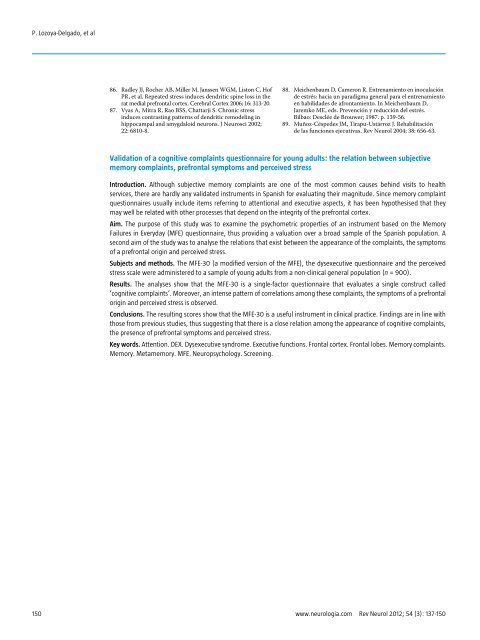Validación de un cuestionario de quejas cognitivas ... - Logicortex
Validación de un cuestionario de quejas cognitivas ... - Logicortex
Validación de un cuestionario de quejas cognitivas ... - Logicortex
You also want an ePaper? Increase the reach of your titles
YUMPU automatically turns print PDFs into web optimized ePapers that Google loves.
P. Lozoya-Delgado, et al<br />
86. Radley JJ, Rocher AB, Miller M, Janssen WGM, Liston C, Hof<br />
PR, et al. Repeated stress induces <strong>de</strong>ndritic spine loss in the<br />
rat medial prefrontal cortex. Cerebral Cortex 2006; 16: 313-20.<br />
87. Vyas A, Mitra R, Rao BSS, Chattarji S. Chronic stress<br />
induces contrasting patterns of <strong>de</strong>ndritic remo<strong>de</strong>ling in<br />
hippocampal and amygdaloid neurons. J Neurosci 2002;<br />
22: 6810-8.<br />
88. Meichenbaum D, Cameron R. Entrenamiento en inoculación<br />
<strong>de</strong> estrés: hacia <strong>un</strong> paradigma general para el entrenamiento<br />
en habilida<strong>de</strong>s <strong>de</strong> afrontamiento. In Meichenbaum D,<br />
Jaremko ME, eds. Prevención y reducción <strong>de</strong>l estrés.<br />
Bilbao: Desclée <strong>de</strong> Brouwer; 1987. p. 139-56.<br />
89. Muñoz-Céspe<strong>de</strong>s JM, Tirapu-Ustárroz J. Rehabilitación<br />
<strong>de</strong> las f<strong>un</strong>ciones ejecutivas. Rev Neurol 2004; 38: 656-63.<br />
Validation of a cognitive complaints questionnaire for yo<strong>un</strong>g adults: the relation between subjective<br />
memory complaints, prefrontal symptoms and perceived stress<br />
Introduction. Although subjective memory complaints are one of the most common causes behind visits to health<br />
services, there are hardly any validated instruments in Spanish for evaluating their magnitu<strong>de</strong>. Since memory complaint<br />
questionnaires usually inclu<strong>de</strong> items referring to attentional and executive aspects, it has been hypothesised that they<br />
may well be related with other processes that <strong>de</strong>pend on the integrity of the prefrontal cortex.<br />
Aim. The purpose of this study was to examine the psychometric properties of an instrument based on the Memory<br />
Failures in Everyday (MFE) questionnaire, thus providing a valuation over a broad sample of the Spanish population. A<br />
second aim of the study was to analyse the relations that exist between the appearance of the complaints, the symptoms<br />
of a prefrontal origin and perceived stress.<br />
Subjects and methods. The MFE-30 (a modified version of the MFE), the dysexecutive questionnaire and the perceived<br />
stress scale were administered to a sample of yo<strong>un</strong>g adults from a non-clinical general population (n = 900).<br />
Results. The analyses show that the MFE-30 is a single-factor questionnaire that evaluates a single construct called<br />
‘cognitive complaints’. Moreover, an intense pattern of correlations among these complaints, the symptoms of a prefrontal<br />
origin and perceived stress is observed.<br />
Conclusions. The resulting scores show that the MFE-30 is a useful instrument in clinical practice. Findings are in line with<br />
those from previous studies, thus suggesting that there is a close relation among the appearance of cognitive complaints,<br />
the presence of prefrontal symptoms and perceived stress.<br />
Key words. Attention. DEX. Dysexecutive syndrome. Executive f<strong>un</strong>ctions. Frontal cortex. Frontal lobes. Memory complaints.<br />
Memory. Metamemory. MFE. Neuropsychology. Screening.<br />
150 www.neurologia.com Rev Neurol 2012; 54 (3): 137-150



